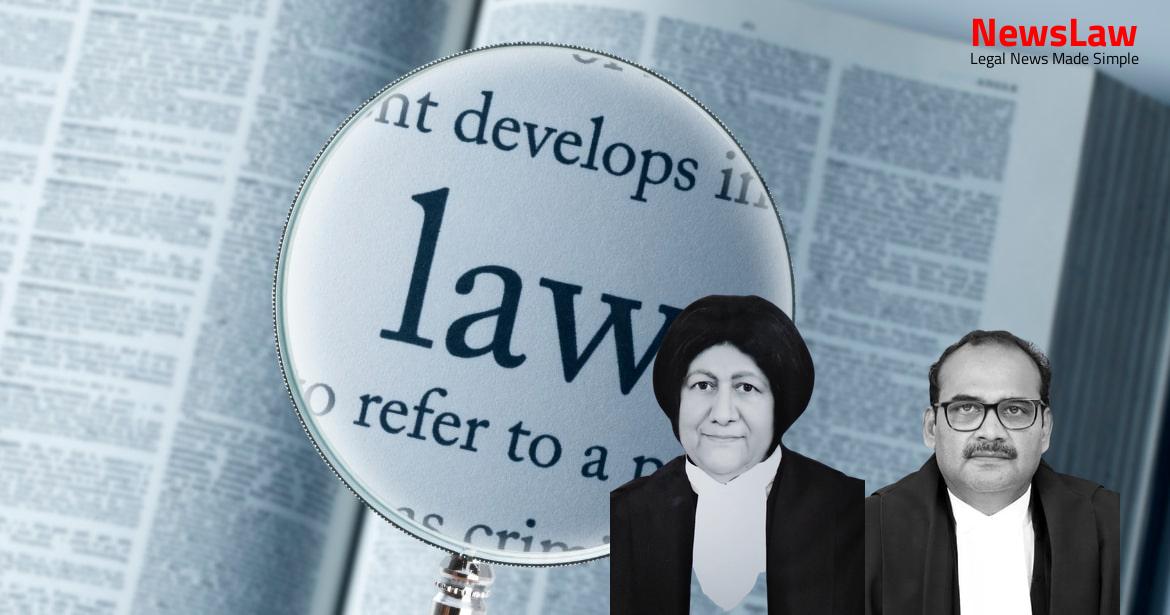Explore the necessity of upholding statutory requirements in bail proceedings, as highlighted by a recent legal case analysis. The court’s focus on victim rights, adherence to statutory provisions, and the significance of providing timely notice underscores the fundamental principles of justice. This examination sheds light on the complexities of legal procedures and their impact on ensuring fair and transparent judicial outcomes.
Facts
- The Special Judge noted that statements of five witnesses were recorded, but crucial witnesses were yet to be examined.
- The second bail application submitted by the first respondent (A-4) was rejected by the court.
- The first respondent instituted an application for bail before the Special Judge, SC/ST (Atrocities Prevention Cases) Ajmer.
- Offences punishable under the Scheduled Castes and the Scheduled Tribes (Prevention of Atrocities) Act, 1989 were added to the case as the deceased belonged to a Scheduled Caste.
- The first respondent appealed the rejection of bail by the Sessions Court to the High Court of Rajasthan.
- On 9 June 2018, a report was lodged by the appellant at Police Station Kishangarh, leading to the registration of FIR No.116/2018.
- Investigation commenced based on the report provided by the appellant.
- High Court heard arguments in appellate proceedings regarding the first respondent’s submission that the deceased’s brother-in-law took an insurance policy in the deceased’s name and committed murder for insurance proceeds.
- First respondent was granted bail by the High Court on 7 November 2019.
- Another Single Judge of the High Court rejected bail application of three co-accused on 29 January 2021.
- Cancellation of bail application was filed on the grounds of lack of notice and opportunity to be heard under SC/ST Act.
- Single Judge rejected cancellation application stating that appellant was being heard, meeting the requirements of the Act.
- Appellant moved High Court under Section 439(2) of CrPC for cancellation of bail.
Also Read: Electoral Malpractices in Mayor Election
Arguments
- Appellant argues fundamental infraction of Section 15A of SC/ST Act by High Court for not issuing notice to him as complainant entitled to be heard in proceedings under the Act including bail.
- Appellant was represented by counsel in the appeal against rejection of first bail application, which was later dismissed as not pressed.
- Failure to issue notice to appellant under Section 15A before bail grant by High Court cannot be justified by later observation of being heard on bail cancellation application.
- Single Judge’s order recorded statement of accused’s counsel about spouse’s allegations in murder case.
- Final report indicates complicity of first respondent in deceased’s murder.
- Investigation shows first respondent, along with co-accused, participated in the murder as per call data records and CCTV footage.
- The learned counsel representing the first respondent argued that the order granting bail was based on the statement of the deceased’s spouse.
- The spouse alleged that the murder of Ram Niwas was carried out by his brother-in-law Kishan Lal with the assistance of his friends.
- The motive for the alleged murder was to gain access to the insurance policy proceeds, which were in the name of the deceased.
- Therefore, the primary accusation is directed towards Kishan Lal as per the counsel representing the first respondent.
Also Read: Balancing Power and Transparency: Electoral Bonds Struck Down, Disclosure Mandated
Analysis
- Section 15A of the SC/ST Act emphasizes the rights of victims and witnesses of caste-based atrocities and the importance of compliance with statutory provisions.
- The statutory provisions aim to protect the constitutional rights of individuals from Scheduled Castes and Scheduled Tribes.
- Victims often face obstacles in accessing justice due to procedural lapses and negligence in investigations and prosecutions.
- Non-compliance with the provisions of the SC/ST Act can lead to prejudices against victims and their dependents.
- Improper investigations and prosecution contribute to low conviction rates under the SC/ST Act, misleadingly suggesting misuse of the legislation.
- The provisions of sub-sections (3) and (5) of Section 15A empower victims to actively participate in criminal proceedings and ensure a right to be heard.
- The importance of adhering to principles of natural justice and providing timely notice to victims or their dependents is highlighted throughout the analysis.
- The role of the police in investigations often marginalizes victims, affecting their involvement in the criminal justice system.
- Instances of atrocities against Scheduled Castes and Scheduled Tribes remain a contemporary issue, necessitating strict adherence to statutory safeguards and enforcement.
- The analysis also critiques the lack of reasoning in the bail decision, highlighting the necessity of considering statutory requirements and victim rights in such proceedings.
- Sub-section (3) of Section 15A grants victims or their dependents the right to receive reasonable, accurate, and timely notice of court proceedings, including bail hearings.
- Sub-section (5) guarantees the right for the victim or their dependent to be heard.
- The term ‘dependent’ is defined in Section 2(bb).
- The requirement of issuing a notice aligns with the right to be heard, as outlined in the provisions of sub-sections (3) and (5) of Section 15A.
- High Court decisions have emphasized that Section 15A aims to protect the rights of victims and witnesses often marginalized in the criminal justice system.
- The duty to record reasons for granting bail is essential, and cannot be obviated by generic statements.
- Brief reasons for granting bail are necessary as they form the basis of the court’s decision.
- Recording of reasons by a judge is a platform of judicial accountability and transparency.
- The final report under Section 173 CrPC contained crucial evidence like call data records and location analysis.
- The High Court’s order granting bail lacked detailed reasoning and only cited submissions by the first respondent’s counsel.
- The High Court’s decision to grant bail was based on limited information provided by the counsel.
- Factors relevant for the grant of bail were not mentioned in the bail order.
- The seriousness and gravity of the offense were not considered.
- The role attributed to the first respondent in the commission of the crime was not evaluated.
- The High Court’s bail order was thus found lacking.
- The appellant filed an application seeking the recall of the bail order.
Also Read: Recall of Resolution Plan Approval: Legal Analysis
Decision
- The order granting bail to the first respondent dated 7 November 2019 is set aside.
- The first respondent must surrender into custody on or before 7 November 2021.
- The appeal is allowed, and the impugned order of the Single Judge of the High Court of Judicature at Rajasthan dated 8 June 2021 is set aside.
- The Single Judge of the High Court’s order dated 8 June 2021 did not engage with the considerations governing bail grant, solely relying on the statement of the deceased’s wife.
- The observations in this judgment are specific to the bail grant for the first respondent and do not impact the case’s merits.
- Any pending applications are disposed of.
Case Title: HARIRAM BHAMBHI Vs. SATYANARAYAN (2021 INSC 701)
Case Number: Crl.A. No.-001278-001278 / 2021



